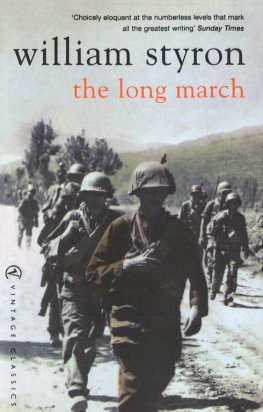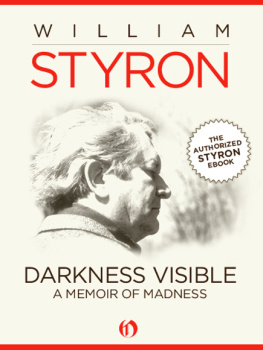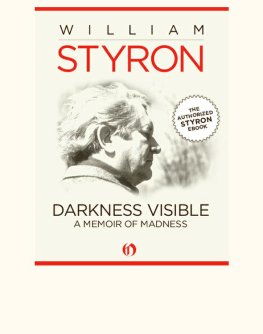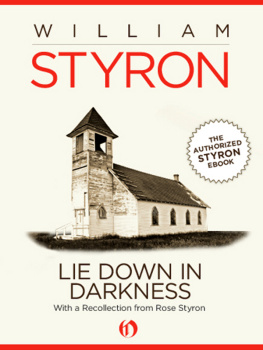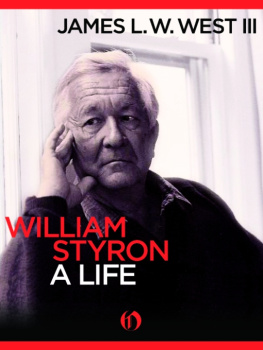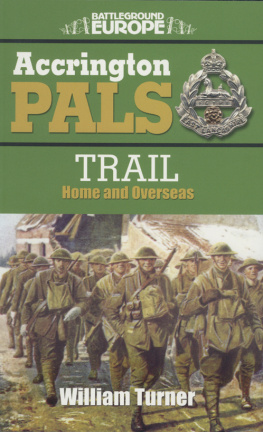William Styron - The Confessions of Nat Turner
Here you can read online William Styron - The Confessions of Nat Turner full text of the book (entire story) in english for free. Download pdf and epub, get meaning, cover and reviews about this ebook. year: 2010, publisher: Open Road Integrated Media, genre: Detective and thriller. Description of the work, (preface) as well as reviews are available. Best literature library LitArk.com created for fans of good reading and offers a wide selection of genres:
Romance novel
Science fiction
Adventure
Detective
Science
History
Home and family
Prose
Art
Politics
Computer
Non-fiction
Religion
Business
Children
Humor
Choose a favorite category and find really read worthwhile books. Enjoy immersion in the world of imagination, feel the emotions of the characters or learn something new for yourself, make an fascinating discovery.
- Book:The Confessions of Nat Turner
- Author:
- Publisher:Open Road Integrated Media
- Genre:
- Year:2010
- Rating:5 / 5
- Favourites:Add to favourites
- Your mark:
- 100
- 1
- 2
- 3
- 4
- 5
The Confessions of Nat Turner: summary, description and annotation
We offer to read an annotation, description, summary or preface (depends on what the author of the book "The Confessions of Nat Turner" wrote himself). If you haven't found the necessary information about the book — write in the comments, we will try to find it.
The Confessions of Nat Turner — read online for free the complete book (whole text) full work
Below is the text of the book, divided by pages. System saving the place of the last page read, allows you to conveniently read the book "The Confessions of Nat Turner" online for free, without having to search again every time where you left off. Put a bookmark, and you can go to the page where you finished reading at any time.
Font size:
Interval:
Bookmark:
The Confessions of Nat Turner
William Styron
Open Road Integrated Media
New York

To
JAMES TERRY
to
LILLIAN HELLMAN
and to
MY WIFE * and * CHILDREN
CONTENTS
AFTERWORD:
Nat Turner Revisited
* *
In August, 1831, in a remote region of southeastern Virginia, there took place the only effective, sustained revolt in the annals of American Negro slavery. The initial passage of this book, entitled To the Public, is the preface to the single significant contemporary document concerning this insurrectiona brief pamphlet of some twenty pages called The Confessions of Nat Turner, published in Richmond early in the next year, parts of which have been incorporated in this book. During the narrative that follows I have rarely departed from the known facts about Nat Turner and the revolt of which he was the leader. However, in those areas where there is little knowledge in regard to Nat, his early life, and the motivations for the revolt (and such knowledge is lacking most of the time), I have allowed myself the utmost freedom of imagination in reconstructing eventsyet I trust remaining within the bounds of what meager enlightenment history has left us about the institution of slavery. The relativity of time allows us elastic definitions: the year 1831 was, simultaneously, a long time ago and only yesterday. Perhaps the reader will wish to draw a moral from this narrative, but it has been my own intention to try to re-create a man and his era, and to produce a work that is less an historical novel" in conventional terms than a meditation on history.
WILLIAM STYRON
Roxbury, Connecticut
New Years Day, 1967
Part
I
JUDGMENT
DAY
ABOVE THE BARREN, SANDY CAPE WHERE the river joins the sea, there is a promontory or cliff rising straight up hundreds of feet to form the last outpost of land. One must try to visualize a river estuary below this cliff, wide and muddy and shallow, and a confusion of choppy waves where the river merges with the sea and the current meets the ocean tide. It is afternoon. The day is clear, sparkling, and the sun seems to cast no shadow anywhere. It may be the commencement of spring or perhaps the end of summer; it matters less what the season is than that the air is almost seasonlessbenign and neutral, windless, devoid of heat or cold. As always, I seem to be approaching this place alone in some sort of boat (it is a small boat, a skiff or maybe a canoe, and I am reclining in it comfortably; at least I have no sense of discomfort nor even of exertion, for I do not rowthe boat is moving obediently to the rivers sluggish seaward wallow), floating calmly toward the cape past which, beyond and far, deep blue, stretches the boundless sea. The shores of the river are unpeopled, silent; no deer run through the forests, nor do any gulls rise up from the deserted, sandy beaches. There is an effect of great silence and of an even greater solitude, as if life here had not so much perished as simply disappeared, leaving allriver shore and estuary and rolling seato exist forever unchanged like this beneath the light of a motionless afternoon sun.
Now as I drift near the cape I raise my eyes to the promontory facing out upon the sea. There again I see what I know I will see, as always. In the sunlight the building stands whitestark white and serene against a blue and cloudless sky. It is square and formed of marble, like a temple, and is simply designed, possessing no columns or windows but rather, in place of them, recesses whose purpose I cannot imagine, flowing in a series of arches around its two visible sides. The building has no door, at least there is no door that I can see. Likewise, just as this building possesses neither doors nor windows, it seems to have no purpose, resembling, as I say, a templeyet a temple in which no one worships, or a sarcophagus in which no one lies buried, or a monument to something mysterious, ineffable, and without name. But as is my custom whenever I have this dream or vision, I dont dwell upon the meaning of the strange building standing so lonely and remote upon its ocean promontory, for it seems by its very purposelessness to be endowed with a profound mystery which to explore would yield only a profusion of darker and perhaps more troubling mysteries, as in a maze.
And so again it comes to me, this vision, in the same haunting and recurrent way it has for many years. Again I am in the little boat, floating in the estuary of a silent river toward the sea. And again beyond and ahead of me, faintly booming and imminent yet without menace, is the sweep of sunlit ocean. Then the cape, then the lofty promontory, and finally the stark white temple high and serene above all, inspiring in me neither fear nor peace nor awe, but only the contemplation of a great mystery, as I move out toward the sea
Never, from the time I was a child until the presentand I am just past thirtywas I able to discover the meaning behind this dream (or vision; for though it occurred mainly as I awoke from sleep, there would be random waking moments when, working in the fields or out trapping rabbits in the woods, or while I was at some odd task or other, the whole scene would flash against my mind with the silence and clearness and fixity of absolute reality, like a picture in the Bible, and in an instants dumb daydream all would be re-created before my eyes, river and temple and promontory and sea, to dissolve almost as swiftly as it had come), nor was I ever able to understand the emotion it caused methis emotion of a tranquil and abiding mystery. I have no doubt, however, that it was all connected with my childhood, when I would hear white people talk of Norfolk and of going to the seaside. For Norfolk was only forty miles eastward from Southampton and the ocean only a few miles past Norfolk, where some of the white people would go to trade. Indeed, I had even known a few Negroes from Southampton who had gone to Norfolk with their masters and then seen the ocean, and the picture they recalledthat of an infinite vastness of blue water stretching out to the limit of the eye, and past that, as if to the uttermost boundaries of the earthinflamed my imagination in such a way that my desire to see this sight became a kind of fierce, inward, almost physical hunger, and there were days when my mind seemed filled with nothing but fantasies of the waves and the distant horizon and the groaning seas, the free blue air like an empire above arching eastward to Africaas if by one single glimpse of this scene I might comprehend all the earths ancient, oceanic, preposterous splendor. But since luck was against me in this regard, and I was never allowed the opportunity of a trip to Norfolk and the ocean, I had to content myself with the vision which existed in my imagination; hence the recurring phantasm I have already described, even though the temple on the promontory still remained a mysteryand more mysterious this morning than ever before in all the years I could reckon. It lingered for a while, half dream, half waking vision as my eyes came open in the gray dawn, and I shut them again, watching the white temple dwindle in the serene and secret light, fade out, removed from recollection.
I rose up from the cedar plank Id been sleeping on and sat halfway erect, in the same somnolent motion duplicating the instinctive mistake Id made four times in as many mornings: swinging my legs sideways off the plank as if to plant them on the floor, only to feel metal bite into my ankles as the chain of the leg irons reached the limit of its slack, holding my feet suspended slantwise in midair. I drew my feet back and let them fall on the plank, then I sat upright and reached down and rubbed my ankles underneath the irons, aware of the flow of blood returning warm beneath my fingers. There was for the first time this year a wintry touch about the morning, damp and cold, and I could see a line of pale frost where the hard clay of the floor met the bottom plank of the jail wall. I sat there for several minutes, rubbing my ankles and shivering some. Suddenly I was very hungry, and I felt my stomach churn and heave. For a while all was still. They had put Hark in the cell next to me the evening before, and now through the planks I could hear his heavy breathinga choked, clotted sound as if air were escaping through his very wounds. For an instant I was on the verge of waking him with a whisper, for we had had no chance to speak, but the sound of his breathing was slow and heavy with exhaustion. I thought, Let him sleep, and the words I had already formed on my lips went unspoken. I sat still on the board, watching the dawn light grow and fill the cell like a cup, stealthily, blossoming with the color of pearl. Far off in the distance now I heard a rooster crow, a faint call like a remote hurrah, echoing, fading into silence. Then another rooster crowed, nearer now. For a long while I sat there, listening and waiting. Save for Harks breathing there was no sound at all for many minutes, until at last I heard a distant horn blow, mournful and familiar-sounding, a hollow soft diminishing cry in the fields beyond Jerusalem, rousing up the Negroes on some farm or other.
Next pageFont size:
Interval:
Bookmark:
Similar books «The Confessions of Nat Turner»
Look at similar books to The Confessions of Nat Turner. We have selected literature similar in name and meaning in the hope of providing readers with more options to find new, interesting, not yet read works.
Discussion, reviews of the book The Confessions of Nat Turner and just readers' own opinions. Leave your comments, write what you think about the work, its meaning or the main characters. Specify what exactly you liked and what you didn't like, and why you think so.


